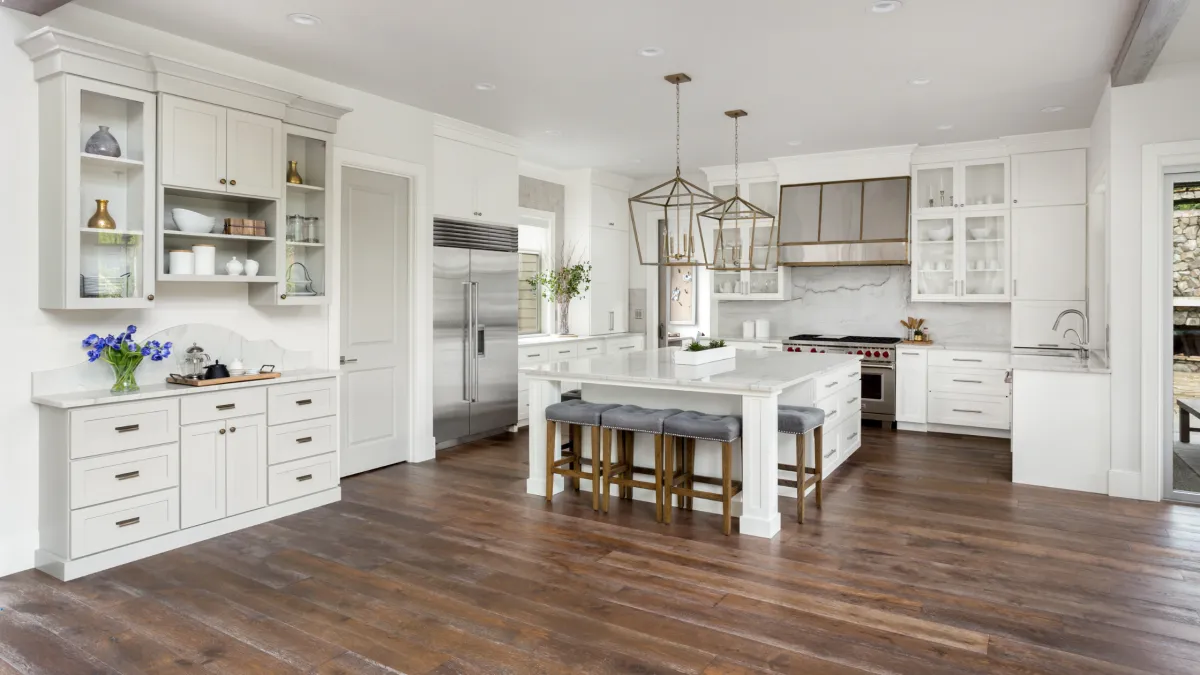Expert Vinyl Plank Flooring for Your Home | The Cabinet Gurus
Vinyl plank flooring has become one of the most popular flooring choices for homeowners looking for an affordable, durable, and stylish option. Unlike traditional hardwood, vinyl planks offer a wood-like appearance without the high maintenance or cost. They are designed to withstand daily wear and tear, making them ideal for busy households, pet owners, and those looking for a long-lasting flooring solution.
Beyond durability, vinyl plank flooring offers versatility in both design and function. Available in various colors and textures, it can complement any space, whether you prefer a modern, rustic, or classic aesthetic. Many homeowners also appreciate its water-resistant properties, which allow it to be used in kitchens, bathrooms, and basements without worry. Investing in vinyl plank flooring means getting the look of real wood with added benefits that make life at home a little easier.
Revitalize Your Property with Our Expert
Cabinet & Design Services

Vinyl Plank Flooring
Choosing the right type of vinyl plank flooring depends on your space, lifestyle, and personal preferences. There are several options available, each with unique benefits suited for different needs.
Luxury Vinyl Plank (LVP) is a popular choice because it closely resembles real hardwood while offering greater durability. It comes in a variety of textures and finishes, making it easy to achieve the look of natural wood without the maintenance requirements. Rigid core vinyl is another option that provides extra strength and stability. This type is ideal for high-traffic areas in the home, as its solid core construction helps prevent dents and wear over time.
Waterproof vinyl plank flooring is designed for areas like bathrooms, kitchens, and basements where moisture exposure is a concern. Unlike traditional hardwood, this type of flooring won’t swell or warp, making it a long-lasting solution for damp environments. Some styles even feature an attached underlayment that helps with sound absorption and comfort underfoot.

Benefits of Vinyl Plank Flooring
Vinyl plank flooring is a practical and stylish choice for any space. It offers several advantages over traditional wood, tile, or laminate flooring, making it a top option for homeowners. Here are some of the key benefits:
Water Resistance: One of the biggest advantages of vinyl plank flooring is its resistance to moisture. Unlike hardwood, which can warp or swell when exposed to water, vinyl planks are designed to handle spills and humidity without damage.
Durability: Built with strong wear layers, vinyl planks can withstand heavy foot traffic, pet claws, and dropped items without showing signs of wear and tear.
Low Maintenance: Cleaning vinyl plank floors is
simple. A quick sweep and occasional damp mop are enough to keep them looking great. There's no need for waxing, sealing, or special treatments.
Comfort and Warmth: Unlike tile or stone, vinyl plank flooring has a softer feel underfoot. Some styles also have a cushioned backing, adding an extra layer of comfort.
Variety of Designs: Advanced printing technology allows vinyl planks to mimic the appearance of hardwood, stone, and other natural materials with impressive detail and texture. Whether you want the look of oak, maple, or reclaimed wood, there is a vinyl plank option to match your style.
With these benefits, vinyl plank flooring provides homeowners with a beautiful and practical flooring solution that stands up to everyday life. It’s a choice that balances style with function, making it a solid investment for any home.

How To Choose The Right Vinyl Plank Flooring
Selecting the best vinyl plank flooring for your home means considering both function and design. Start by assessing the room where it will be installed. High-traffic areas like hallways and living rooms benefit from thicker planks with a stronger wear layer, while moisture-prone spaces require waterproof options.
The style of your flooring should complement your existing décor. Whether you prefer a rustic wood-look plank or a sleek, modern finish, there are endless color and texture options to suit your taste. If you have pets or small children, look for scratch-resistant finishes that can hold up to daily use.
The method of installation is another factor. While some planks click together for a floating floor setup that doesn’t require nails or glue, others must be glued down for added stability. Understanding these differences can help you make an informed decision that fits your home’s needs.
Professional Vinyl Plank Flooring Installation
Having vinyl plank flooring professionally installed ensures a flawless finish and long-term durability. A quality installation starts with proper subfloor preparation. Uneven surfaces can affect the flooring’s appearance and performance, so professionals take the time to level the area before placing the planks.
There are two main installation methods: floating and glue-down. Floating floors use a locking system to keep the planks in place without adhesive, making them easier to remove or replace if needed. Glue-down flooring offers extra stability and is often preferred for commercial spaces or areas where heavy furniture will be placed.
When installed correctly, vinyl plank flooring provides a seamless and polished look that enhances any room. Finding a trusted professional to handle the process ensures the job is done right, giving you peace of mind and a surface that will last for years to come.
Request a Quote
Build the Kitchen Of
Your Dreams Today


57
Kitchens Remodeled

176
Happy Clients
What our Valuable Customer
"The Cabinet Gurus transformed our kitchen with their exceptional design and high-quality cabinets. The entire process was seamless and exceeded our expectations!"

Zac L
Springfield
"From precise measurements to flawless installation, The Cabinet Gurus provided top-notch service and beautiful cabinets. We couldn't be happier with our new kitchen!"

Katrina G
Hartford
"The Cabinet Gurus' professional team and quality products made our kitchen renovation a breeze. Highly recommend their services for any kitchen project!"

Christine R
Westford
HIC# 0699513
Fully licensed and insured

